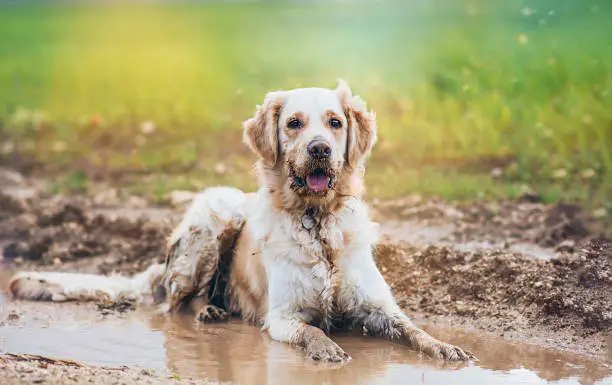Introduction
It can be puzzling and concerning when your dog starts eating dirt. While it might seem like an odd behavior, it’s actually relatively common among dogs. Dirt-eating, known as pica, is the consumption of non-food items, and it can have various underlying causes. In this blog, we’ll explore the reasons why dogs eat dirt, potential health implications, and what you can do to address this behavior.
Reasons Why Dogs Eat Dirt
Understanding why your dog is eating dirt involves looking at several potential factors. Each dog is unique, so the reasons behind this behavior can vary.
1. Nutritional Deficiencies
One of the most common reasons dogs eat dirt is to compensate for nutritional deficiencies. Dogs may instinctively seek out dirt to obtain minerals or nutrients that their diet is lacking. For example, if a dog’s diet is low in certain vitamins or minerals, they might turn to dirt as a source of these nutrients.
Solution: Ensure your dog is receiving a balanced diet with all necessary nutrients. Consult your veterinarian to review your dog’s diet and consider supplementing with high-quality dog food or specific supplements if needed.
2. Gastrointestinal Issues
Dogs sometimes eat dirt to alleviate gastrointestinal discomfort or nausea. The consumption of dirt may help induce vomiting or provide temporary relief to an upset stomach. This behavior can be seen when dogs are feeling unwell or have ingested something that irritates their digestive system.
Solution: If your dog is eating dirt frequently, monitor for other signs of gastrointestinal distress, such as vomiting, diarrhea, or changes in appetite. Consult your veterinarian to diagnose and address any underlying digestive issues.
3. Boredom or Anxiety
Dogs that are bored or anxious may resort to eating dirt as a coping mechanism. Similar to other forms of compulsive behavior, dirt-eating can serve as an outlet for excess energy or stress. Dogs that lack mental stimulation or sufficient physical exercise may engage in dirt-eating out of boredom.
Solution: Increase your dog’s physical and mental stimulation through regular exercise, interactive toys, and engaging activities. Addressing boredom and anxiety can help reduce the likelihood of dirt-eating behavior.
4. Instinctive Behavior
In the wild, dogs’ ancestors might have consumed dirt as part of their natural behavior. This could be related to instinctive behaviors, such as seeking out specific textures or tastes that mimic natural food sources. Although domestic dogs don’t need to eat dirt for survival, this instinctive behavior may still manifest.
Solution: Understanding that this behavior may have evolutionary roots can help you manage it without undue concern. However, ensuring that your dog has a well-balanced diet and appropriate stimulation is still important.
5. Medical Conditions
Certain medical conditions can lead to pica, including dirt-eating. Conditions such as anemia, parasites, or metabolic disorders might prompt a dog to consume non-food items. If dirt-eating is persistent or accompanied by other unusual symptoms, it may indicate a health issue.
Solution: Have your dog evaluated by a veterinarian to rule out any medical conditions that might be causing the behavior. A thorough examination and diagnostic tests can help identify any underlying health issues.
Potential Risks of Eating Dirt
While occasional dirt-eating might not be harmful, there are potential risks associated with this behavior.
1. Toxic Substances
Dirt can sometimes contain harmful substances such as pesticides, fertilizers, or heavy metals. Ingesting dirt that has been contaminated with these chemicals can lead to poisoning or other health issues.
Solution: Ensure your dog’s environment is free from harmful chemicals and toxins. Supervise your dog when they are outside and avoid letting them eat dirt from areas that may have been treated with chemicals.
2. Gastrointestinal Problems
Eating dirt can lead to gastrointestinal problems, including blockages, constipation, or irritation of the digestive tract. Ingesting large amounts of dirt or non-digestible materials can disrupt normal digestive function.
Solution: Monitor your dog for signs of gastrointestinal distress, such as vomiting or changes in stool. If your dog shows symptoms of a digestive issue, consult your veterinarian for appropriate treatment.
3. Parasites
Dirt can harbor parasites such as worms or bacteria. Consuming contaminated dirt can increase the risk of parasitic infections or other health problems.
Solution: Maintain good hygiene and regular deworming practices for your dog. Regular veterinary check-ups and parasite prevention measures can help protect your dog from infections.
How to Manage and Prevent Dirt-Eating
If your dog is eating dirt, there are several strategies you can use to manage and prevent this behavior.
1. Improve Diet and Nutrition
Ensure that your dog is on a well-balanced diet that meets all their nutritional needs. Consult with your veterinarian to determine if any dietary changes or supplements are necessary.
2. Increase Exercise and Mental Stimulation
Provide your dog with ample opportunities for physical exercise and mental stimulation. Activities such as walks, playtime, and puzzle toys can help reduce boredom and anxiety.
3. Address Behavioral Issues
If dirt-eating is due to boredom or anxiety, work on addressing these underlying issues. Training, behavior modification, and providing a stimulating environment can help reduce the behavior.
4. Supervise Outdoor Time
Monitor your dog while they are outside to prevent them from eating dirt. Redirect their attention to more appropriate activities and provide plenty of safe chew toys.
5. Consult a Veterinarian
If dirt-eating persists or is accompanied by other concerning symptoms, consult your veterinarian. A thorough evaluation can help identify any underlying health issues and provide appropriate treatment.
Conclusion
While eating dirt may seem like an odd behavior, it’s relatively common among dogs and can be caused by a variety of factors. By understanding the reasons behind this behavior and taking steps to address any potential issues, you can help ensure your dog’s health and well-being. If you have concerns about your dog’s dirt-eating habits, consulting with a veterinarian is always a good idea to rule out any serious health conditions.











Leave a Reply